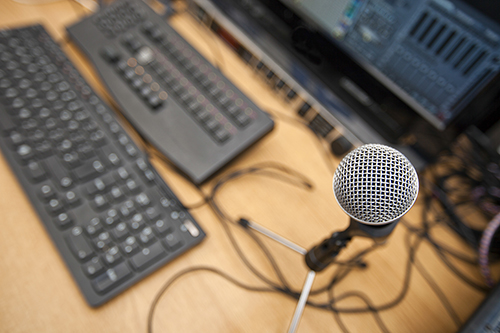Podcasting is an appealing way to add unique content to your website. It also helps a business owner attract a new audience and increases awareness. Many people subscribe to podcasts and thus podcasting (much like email marketing) can be a valuable tool to put yourself in front of your customer on a consistent basis. However, while podcasting is a valuable content strategy, many podcasters make mistakes causing them to lose their audience and even miss out on valuable listeners. Here are thirteen important things all podcasters should know.
1. Make sure you have a reliable podcasting host. As a listener, there’s nothing worse than not being able to download your podcast or listen to it due to hosting issues. Search online for reputable hosts that can also manage your podcast size and audience.
2. Choose your microphone carefully. Headsets are easier to use but they often have a poorer quality, which in turn makes your audio sound scratchy and/or difficult to understand. And microphones, headset or free standing, can be positioned too close to your mouth, which will result in varied volumes. Also, if a microphone is too close it can record your breathing. Your audience doesn’t want to hear your every breath!
3. Edit your podcast from your listener’s perspective. That means ruthlessly cutting out all extraneous content.
4. Add a professional touch. Music is a great way to not only signal that the podcast is starting and ending, it’s also a nice professional touch.
5. Strategically place your advertisements and promotions. Ever listen to a podcast that seemed to be one long list of ads and promotions? Nobody wants to listen to that. Place your advertisements at strategic points in your content. Many podcasters place them right in the beginning or at the very end. Either is fine; you can even pause in the middle for a quick ad if you choose. However, be consistent and remember the 80/20 principle: 80% valuable content and 20% promotion.
6. Never use copyrighted music in your podcast. You could end up having to pay big bucks to the owner.
7. Keep your advertisements short. Listeners can easily ”fast forward” and not listen to your advertisements. If you keep them to 10-15 seconds, they won’t exert the effort to skip over them. Additionally, transition into them as you’re speaking so that the listener isn’t immediately aware that they’re listening to an ad.
8. Make sure that you keep the ads free of time constraints. Due to the nature of a podcast, a person can listen to it today or six months from now. If your advertisements have a “limited time offer” call to action, then you’ll miss many potential customers.
9. Make sure that your broadcast frequency is consistent. You want people to make listening to your podcast a habit.
10. Give each podcast a headline or title and make sure that it offers your audience a benefit so they’re more likely to give it a listen.
11. Track downloads and test headlines for open rates. Track click-through rates by sending audiences to specific web pages. Many audio/podcasting services give you important statistics on downloads, play time and listens to completion.
12. RSS is how you tell your listeners you have a podcast available. Many podcast directories require RSS feeds, including iTunes. You will want to make sure you’re using the same technology that iTunes recognizes, otherwise you’ll have to do your work twice! Not much fun. iTunes considers your RSS feed the current and authoritative source for information about your podcast. It is important to make sure it’s correct and up to date.
13. Make sure to tag your podcast for the search engines. Tools like iTunes offer a wide variety of tagging options and categories. Use these to help drive traffic to your podcast and ultimately to your website.
Podcasting is a wonderful way to reach an entirely new audience and grow your business. If you podcast or are thinking about adding podcasting to your content and marketing strategy, make a commitment for the long haul. People tend to subscribe to podcasts that demonstrate they’re going to be around for a while.

